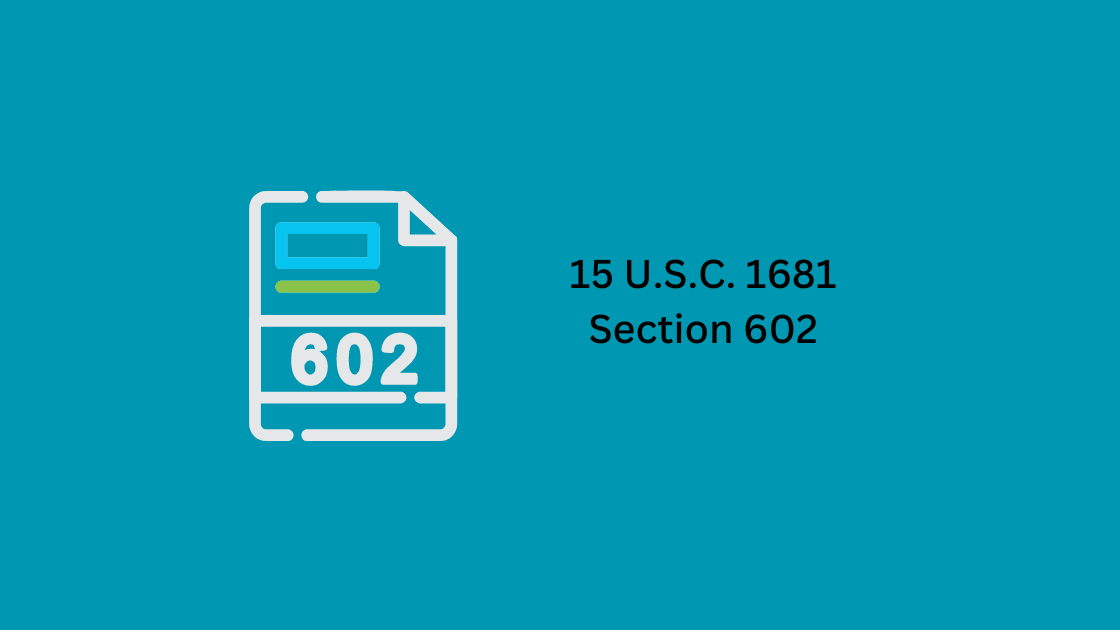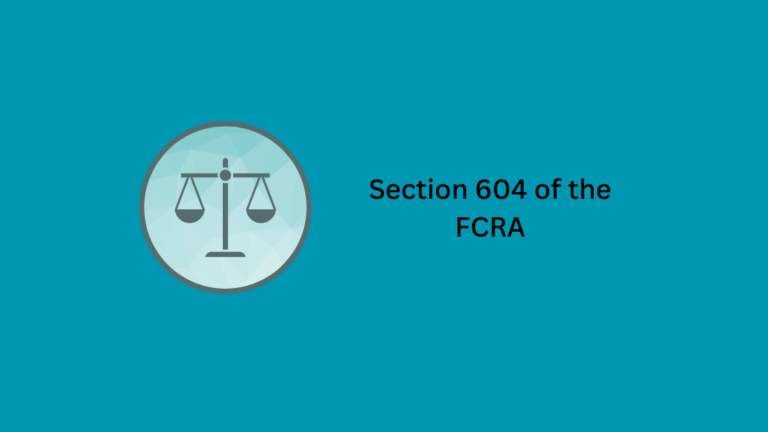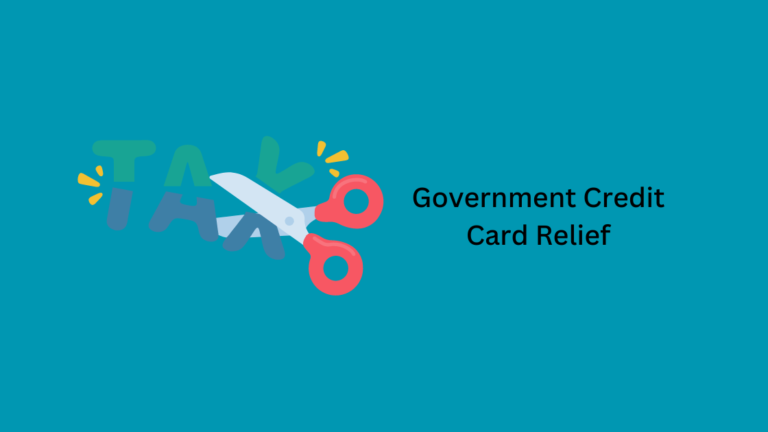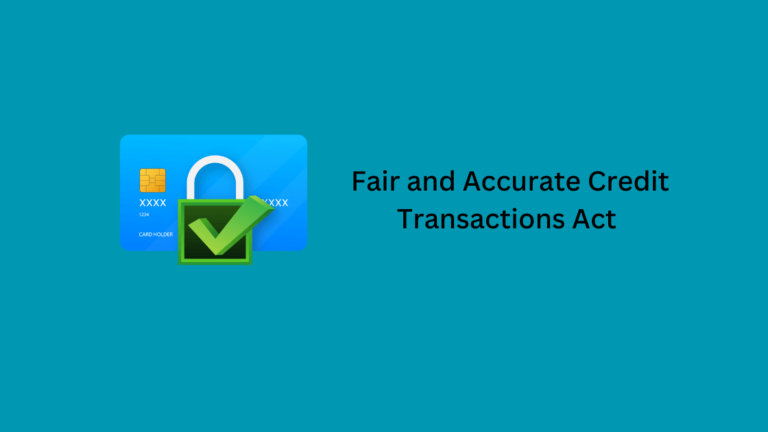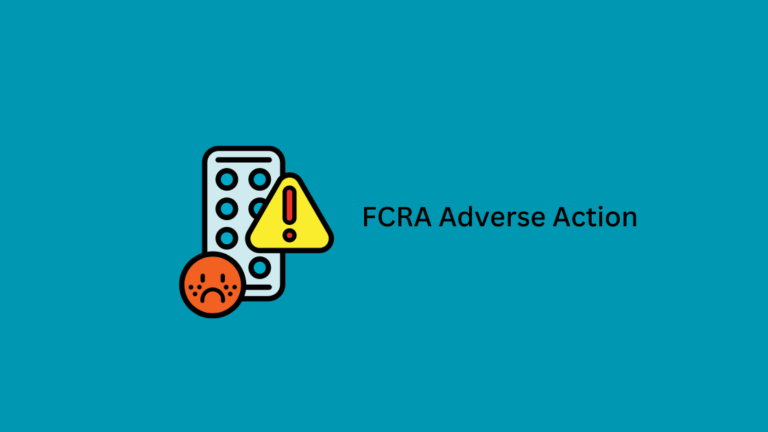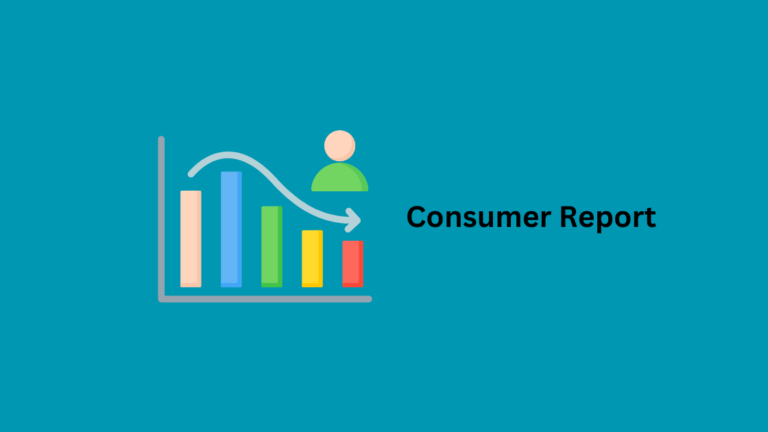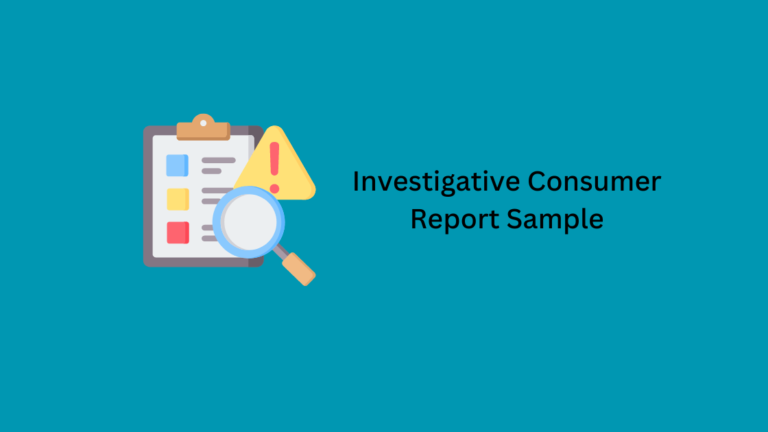15 U.S.C. 1681 Section 602: Understanding Your Credit Rights
15 U.S.C. 1681 Section 602 states that consumer credit reporting is vital for the economy.
It aims to ensure accuracy and fairness in credit reporting. Credit reporting is crucial for the financial system. It affects lending, employment, and insurance decisions. Accurate credit reports help maintain consumer trust and economic stability. The Fair Credit Reporting Act (FCRA) governs these reports.
It ensures information is fair and accurate. Consumers can dispute errors and access their reports. The FCRA also limits who can access credit reports. This protects consumer privacy. Regularly checking your credit report can help detect identity theft. It also ensures your credit information is correct. Understanding your rights under the FCRA is essential. It empowers you to take control of your financial health.
Legal Framework
The Legal Framework of 15 U.S.C. 1681 Section 602 outlines the rules for credit reporting. It ensures that information is accurate and fair. This section is part of the Fair Credit Reporting Act (FCRA).
History Of Credit Legislation
Credit legislation in the U.S. has evolved. The FCRA was enacted in 1970. It aimed to protect consumer rights. The act requires credit agencies to follow strict guidelines. These rules help maintain fairness and accuracy in credit reporting.
Before the FCRA, credit reporting was less regulated. Consumers had little control over their credit information. The FCRA changed this by giving consumers more rights. It also set penalties for non-compliance. This ensures that credit agencies adhere to the law.
Role Of The Federal Trade Commission
The Federal Trade Commission (FTC) plays a crucial role. It enforces the rules set by the FCRA. The FTC ensures that credit agencies comply with the law. It also provides resources for consumers. These resources help people understand their rights under the FCRA.
The FTC investigates complaints about credit reporting. It can take legal action against agencies that violate the rules. This helps protect consumers from unfair practices. The FTC also offers educational materials. These materials explain how to manage credit responsibly.
| Year | Key Legislation |
|---|---|
| 1970 | Fair Credit Reporting Act (FCRA) |
| 1996 | FCRA Amendments |
| 2003 | Fair and Accurate Credit Transactions Act (FACTA) |
- Accurate Information: Credit reports must be accurate and fair.
- Consumer Rights: Consumers have rights under the FCRA.
- FTC Oversight: The FTC oversees and enforces the FCRA.
- Understand your rights under the FCRA.
- Regularly check your credit report.
- Report any inaccuracies to the FTC.
Key Provisions
The 15 U.S.C. 1681 Section 602 is part of the Fair Credit Reporting Act (FCRA). This section outlines the essential rights and duties for consumers and credit bureaus. The key provisions ensure fairness, accuracy, and privacy in credit reporting.
Consumer Rights
Consumers have important rights under this section. Here are some key rights:
- Access to Credit Reports: Consumers can request their credit reports once a year.
- Dispute Inaccuracies: If there are errors, consumers can dispute them.
- Notification of Negative Information: Creditors must inform consumers if negative information is reported.
- Protection of Personal Information: Credit bureaus must keep personal data private.
These rights help protect consumers from unfair credit practices.
Responsibilities Of Credit Bureaus
Credit bureaus have crucial responsibilities to ensure fair credit reporting. These include:
| Responsibility | Description |
|---|---|
| Accuracy | Credit bureaus must report correct and updated information. |
| Investigation | They must investigate disputes within 30 days. |
| Confidentiality | Personal data must be protected and shared only with authorized entities. |
| Disclosure | Credit bureaus must provide a free annual credit report upon request. |
These responsibilities ensure that credit reporting remains fair and accurate.
Your Credit Report
Your credit report holds essential information about your financial history. It affects your ability to get loans, credit cards, and even jobs. Understanding your credit report is crucial for maintaining a healthy financial life.
What Information Is Included
Your credit report includes several key pieces of information:
- Personal Information: Your name, address, Social Security number, and date of birth.
- Credit Accounts: Details about your credit cards, loans, and payment history.
- Credit Inquiries: A list of everyone who has accessed your report.
- Public Records: Bankruptcies, foreclosures, and tax liens.
- Collections: Any unpaid debts sent to collection agencies.
How To Access Your Report
You can access your credit report in several ways:
- Visit creditrepaircloud.com for a free report.
- Request by phone: Call 1-877-322-8228.
- Mail a request form to the Annual Credit Report Request Service.
Make sure to check your report regularly for errors. Correcting mistakes can improve your credit score.

Credit: m.youtube.com
Disputing Errors
Errors on your credit report can affect your financial health. The Fair Credit Reporting Act (FCRA) provides a way to dispute these errors. Section 602 of 15 U.S.C. 1681 details the process. It ensures that your credit report is accurate and fair.
Identifying Mistakes
First, get a copy of your credit report. Review it carefully. Look for incorrect information. Common mistakes include:
- Misspelled names
- Wrong addresses
- Incorrect account information
- Duplicate accounts
Note: Your report should have your current details.
Filing A Dispute
Once you find an error, you need to file a dispute. Follow these steps:
- Contact the credit bureau.
- Explain the mistake clearly.
- Provide supporting documents.
Use the following table to keep track of your disputes:
| Credit Bureau | Contact Date | Dispute Reason | Status |
|---|---|---|---|
| Equifax | 2023-10-01 | Wrong address | Pending |
| Experian | 2023-10-02 | Duplicate account | Resolved |
Pro Tip: Keep copies of all communications.
By following these steps, you can correct errors. This will improve your credit score.
Protecting Your Credit
Your credit is a vital part of your financial health. The United States government created laws to safeguard your credit information. One such law is 15 U.S.C. 1681 Section 602. This law aims to protect your credit data and ensure its accuracy. Let’s explore how you can protect your credit with these guidelines.
Preventing Identity Theft
Identity theft is a serious issue. It can ruin your credit score quickly. Here are steps to prevent identity theft:
- Shred documents with personal information before disposing of them.
- Use strong passwords for online accounts.
- Regularly check your bank statements for suspicious activities.
- Keep your Social Security Number secure.
Monitoring Your Credit
Monitoring your credit helps you spot errors early. Here are some tips:
- Get a free credit report from AnnualCreditReport.com every year.
- Set up credit alerts with your bank.
- Consider using a credit monitoring service.
- Check your credit score regularly.
By following these steps, you can keep your credit safe. It is important to stay vigilant. Your financial future depends on it.

Credit: www.youtube.com
Impacts On Financial Health
The 15 U.S.C. 1681 Section 602 significantly influences your financial health. This section of the U.S. Code governs how credit information is collected and used. Your financial activities and credit scores are directly affected. Understanding this can help you make better financial decisions.
Effect On Loan Applications
When applying for a loan, lenders check your credit report. A good credit report increases your chances of approval. A bad report can lead to rejection. Lenders look at your payment history and credit utilization. These factors are part of your credit report. Always aim to maintain a positive credit history.
Influence On Interest Rates
Your credit score directly impacts your interest rates. Higher scores often lead to lower interest rates. Lower scores usually result in higher interest rates. This means you pay more over time. Keeping a high credit score can save you money.
| Credit Score Range | Typical Interest Rate |
|---|---|
| Excellent (750-850) | 3-4% |
| Good (700-749) | 4-5% |
| Fair (650-699) | 5-6% |
| Poor (600-649) | 6-8% |
| Very Poor (300-599) | 8-10% |
Always check your credit score before applying for loans. This helps you predict your interest rate. Aim to improve your credit score if needed.
Resources And Assistance
Understanding 15 U.S.C. 1681 Section 602 can be challenging. Thankfully, there are many resources and assistance options available. These resources help individuals navigate credit reporting laws and protect their credit information.
Government Resources
The U.S. government offers various resources to assist with credit issues.
- Federal Trade Commission (FTC): The FTC provides information on credit reporting rights. They also offer guidance on how to dispute errors on credit reports.
- Consumer Financial Protection Bureau (CFPB): The CFPB helps consumers understand their rights under the Fair Credit Reporting Act. They also take complaints and provide educational materials.
- AnnualCreditReport.com: This is the official site to get free credit reports. You can get one free report from each of the three major credit bureaus every year.
Non-profit Organizations
Non-profit organizations also offer valuable assistance.
- National Foundation for Credit Counseling (NFCC): The NFCC offers credit counseling and financial education. They provide services to help manage debt and improve credit scores.
- Credit Builders Alliance (CBA): The CBA works with non-profits to help low-income people build credit. They offer tools and programs to improve financial stability.
- Consumer Action: This organization offers educational resources on credit reporting. They provide guides and tools to help understand credit reports and scores.
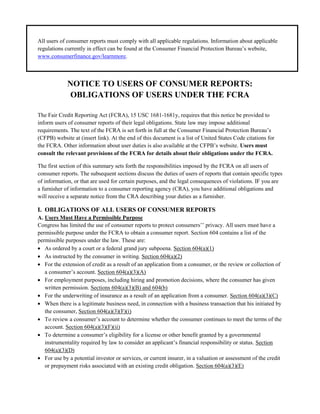
Credit: www.slideshare.net
Future Of Credit Rights
The landscape of credit rights is evolving. With 15 U.S.C. 1681 Section 602, changes are on the horizon. This section outlines key developments. Stay informed about the future of credit rights.
Proposed Legislation
New laws aim to protect consumers. These laws focus on data accuracy and privacy. Legislators propose stricter rules for credit reporting agencies. This ensures fair treatment for all consumers.
| Proposal | Impact |
|---|---|
| Stricter Data Accuracy | Fewer errors in credit reports |
| Enhanced Privacy | Better protection of personal data |
| Greater Transparency | Clearer understanding of credit scores |
Technological Advances
Technology is reshaping credit rights. Innovations in AI and blockchain promise big changes. These tools can increase accuracy and security. Consumers will benefit from these advancements.
- AI helps identify errors quickly.
- Blockchain ensures secure data transactions.
- Mobile apps offer instant credit report access.
These tech advances make credit management easier. They also make it safer. Expect more tools to emerge, helping you manage your credit effectively.
Frequently Asked Questions
1. What Is 15 Usc 1681 Section 602?
15 USC 1681 section 602 outlines the purpose of the Fair Credit Reporting Act. It aims to ensure accuracy, fairness, and privacy in consumer credit reporting. This section emphasizes the need for consumer protection and the importance of accurate credit information.
2. What Is The 15 Usc Code 1681?
15 USC code 1681 is part of the Fair Credit Reporting Act (FCRA). It regulates credit reporting agencies and protects consumer information.
3. What Is The 15 Code 1681s 2b?
The 15 code 1681s 2b refers to a section of the Fair Credit Reporting Act. It addresses the responsibilities of information furnishers in disputes.
4. What Are The Compliance Procedures For 15 Us Code 1681e?
Compliance with 15 U. S. Code § 1681e involves ensuring accuracy, updating information regularly, verifying data sources, and providing consumer disclosures. Regularly audit procedures to maintain compliance and protect consumer rights.
Conclusion
Understanding 15 U. S. C. 1681 Section 602 ensures better handling of consumer credit information. This knowledge empowers consumers and businesses. Stay informed to protect your financial health and rights. Make sure to regularly review your credit reports. Implement these insights for better financial decisions and compliance.

